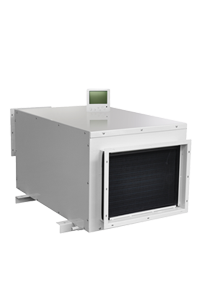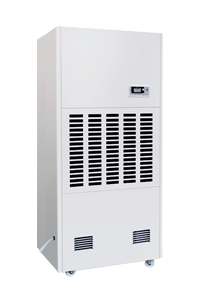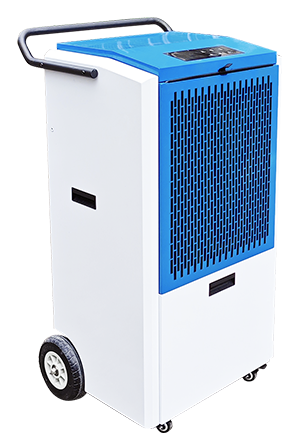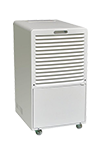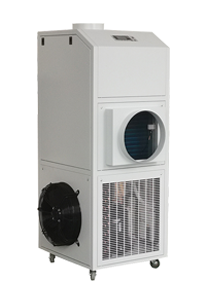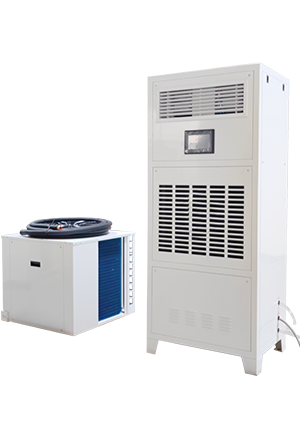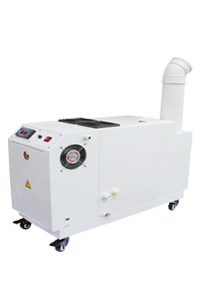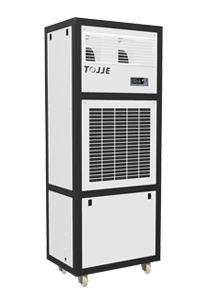News
Industrial dehumidifiers are powerful machines designed to reduce and control humidity levels in large spaces such as warehouses, factories, commercial buildings, and other industrial environments. By maintaining optimal humidity levels, these dehumidifiers play a crucial role in protecting both property and health.
Benefits of Industrial Dehumidifiers:
1. Property Protection:
-
Preventing Mold and Mildew:
- High humidity levels can lead to the growth of mold and mildew, which can damage building materials, inventory, and equipment. Industrial dehumidifiers remove excess moisture from the air, preventing these issues.
-
Protecting Equipment and Inventory:
- In industrial settings, excessive humidity can cause rust and corrosion on machinery and electronic equipment. Dehumidifiers help protect these assets, reducing the need for costly repairs or replacements.
- For industries like food storage, pharmaceuticals, and textiles, maintaining the right humidity levels is critical to preserving the quality and shelf life of products.
-
Structural Integrity:
- Prolonged exposure to high humidity can weaken structural materials like wood, drywall, and insulation. By controlling humidity, dehumidifiers help maintain the integrity of the building.
-
Preventing Condensation:
- In humid environments, condensation can form on walls, ceilings, and floors, leading to water damage and potential slip hazards. Dehumidifiers reduce condensation, helping to keep surfaces dry and safe.
2. Health Protection:
-
Reducing Allergens:
- High humidity levels can increase the presence of dust mites, mold spores, and other allergens in the air, which can trigger respiratory issues and allergies. By lowering humidity, industrial dehumidifiers help create a healthier indoor environment.
-
Improving Air Quality:
- Controlling humidity also improves overall air quality by reducing the likelihood of musty odors and airborne contaminants associated with damp environments.
-
Comfortable Working Conditions:
- High humidity can make temperatures feel hotter than they actually are, leading to discomfort and reduced productivity. Dehumidifiers help maintain a comfortable climate, improving the working conditions for employees.
-
Preventing Health Risks:
- In environments like hospitals, laboratories, and food processing plants, maintaining strict humidity control is essential to prevent the growth of bacteria and viruses that thrive in humid conditions. This helps safeguard the health of workers and consumers.
Applications of Industrial Dehumidifiers:
-
Warehouses and Storage Facilities:
- Protecting goods from moisture damage and maintaining optimal storage conditions for a variety of products, including electronics, food, and pharmaceuticals.
-
Manufacturing Plants:
- Ensuring the longevity of machinery and maintaining consistent production quality by preventing moisture-related issues.
-
Food Processing and Storage:
- Preventing spoilage and maintaining sanitary conditions by controlling the humidity in areas where food is processed or stored.
-
Data Centers and Server Rooms:
- Protecting sensitive electronic equipment from condensation and corrosion by keeping humidity levels in check.
-
Hospitals and Laboratories:
- Ensuring a sterile environment and preventing the growth of harmful microorganisms by maintaining low humidity levels.
-
Textile and Paper Industries:
- Controlling humidity to prevent product degradation and ensuring quality in industries where moisture can affect materials like textiles and paper.
Features to Look for in an Industrial Dehumidifier:
-
Capacity:
- The capacity of a dehumidifier is measured in pints or liters of moisture removed per day. Choose a unit with the appropriate capacity based on the size of the area and the level of humidity.
-
Energy Efficiency:
- Look for energy-efficient models to reduce operating costs, especially in large facilities where the dehumidifier may run continuously.
-
Durability:
- Industrial dehumidifiers should be built to withstand harsh conditions, with robust construction and corrosion-resistant materials.
-
Ease of Maintenance:
- Features like easy-access filters, auto-drain systems, and simple controls can make maintenance easier and ensure the unit runs efficiently over time.
-
Automation and Controls:
- Advanced models may offer programmable settings, humidity sensors, and remote monitoring capabilities, allowing for precise control and ease of operation.
-
Mobility:
- Depending on the needs of your facility, you may want a portable dehumidifier with wheels or handles, allowing it to be moved between different areas as needed.
Industrial dehumidifiers are essential tools for maintaining a healthy and safe environment in large facilities. By controlling humidity, they protect property from moisture damage and enhance the well-being of employees and occupants. Investing in the right industrial dehumidifier can lead to long-term savings by preventing damage, reducing energy costs, and ensuring a comfortable, healthy workplace.

